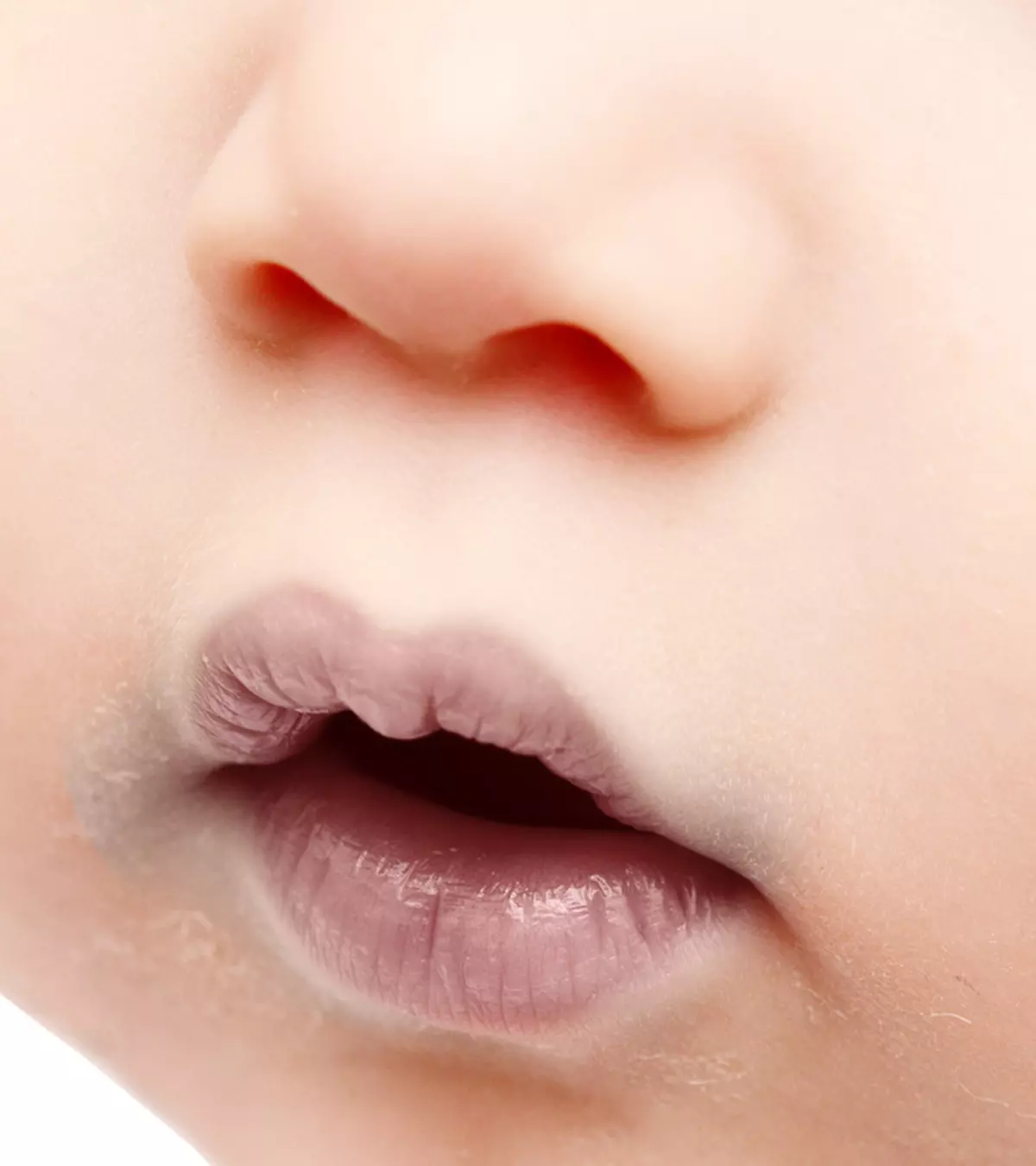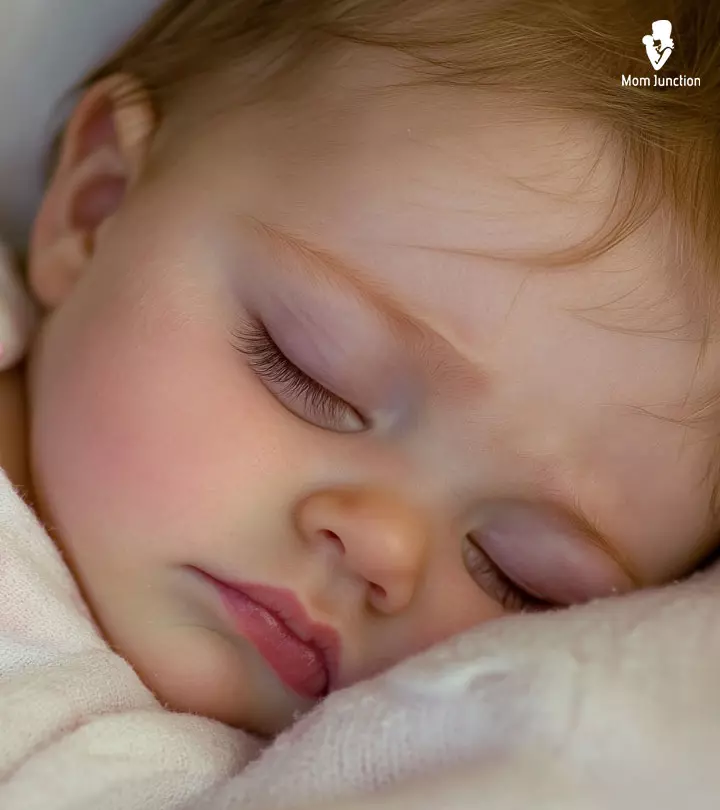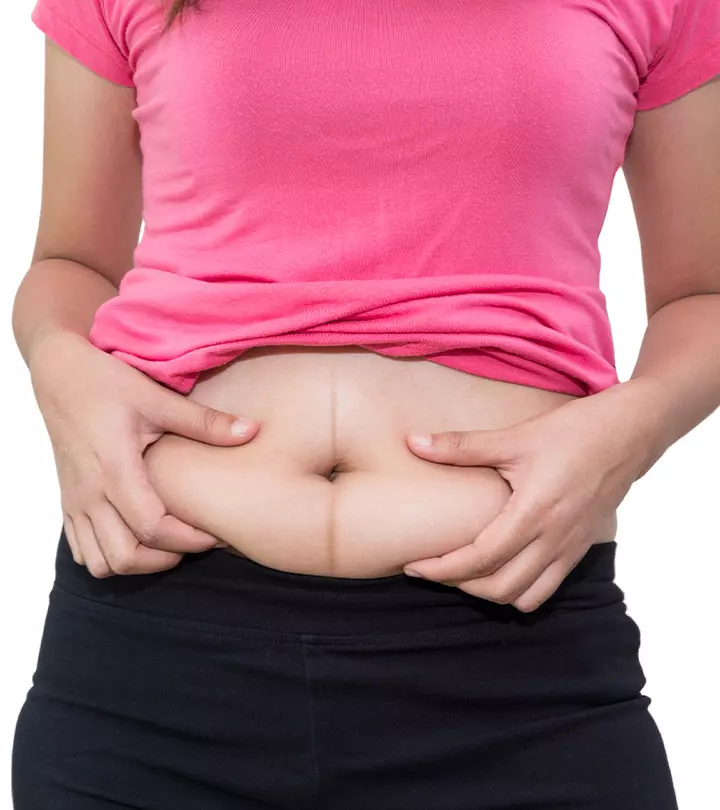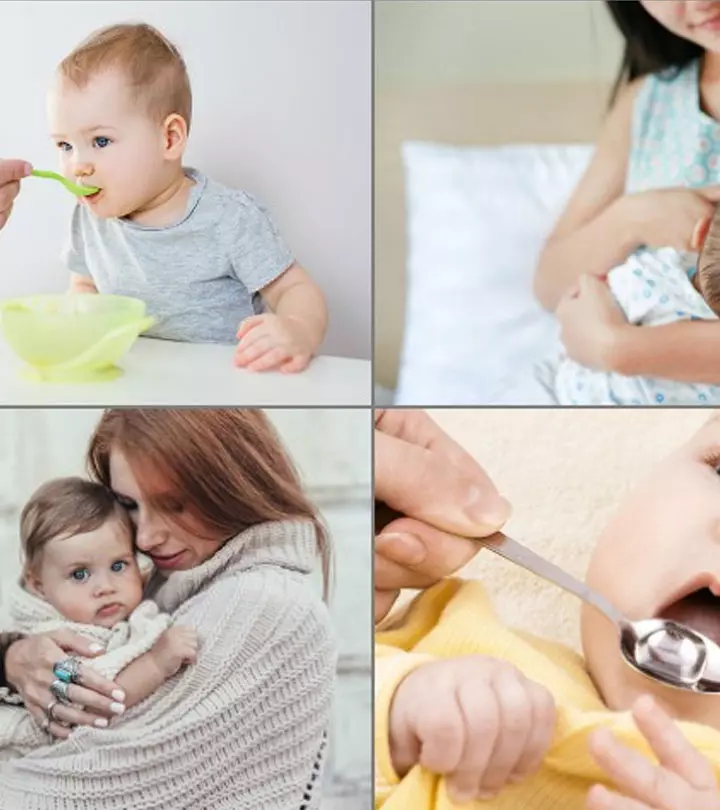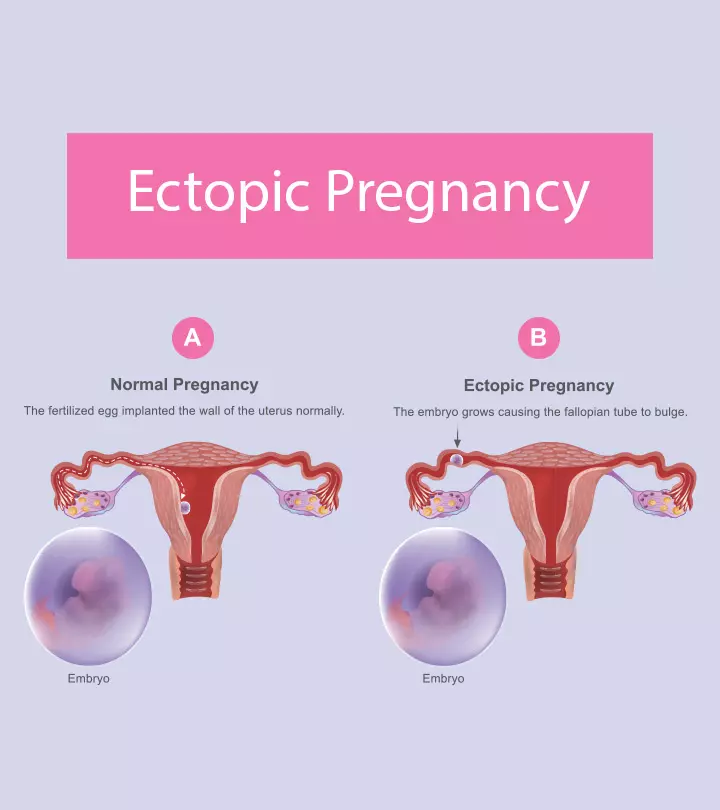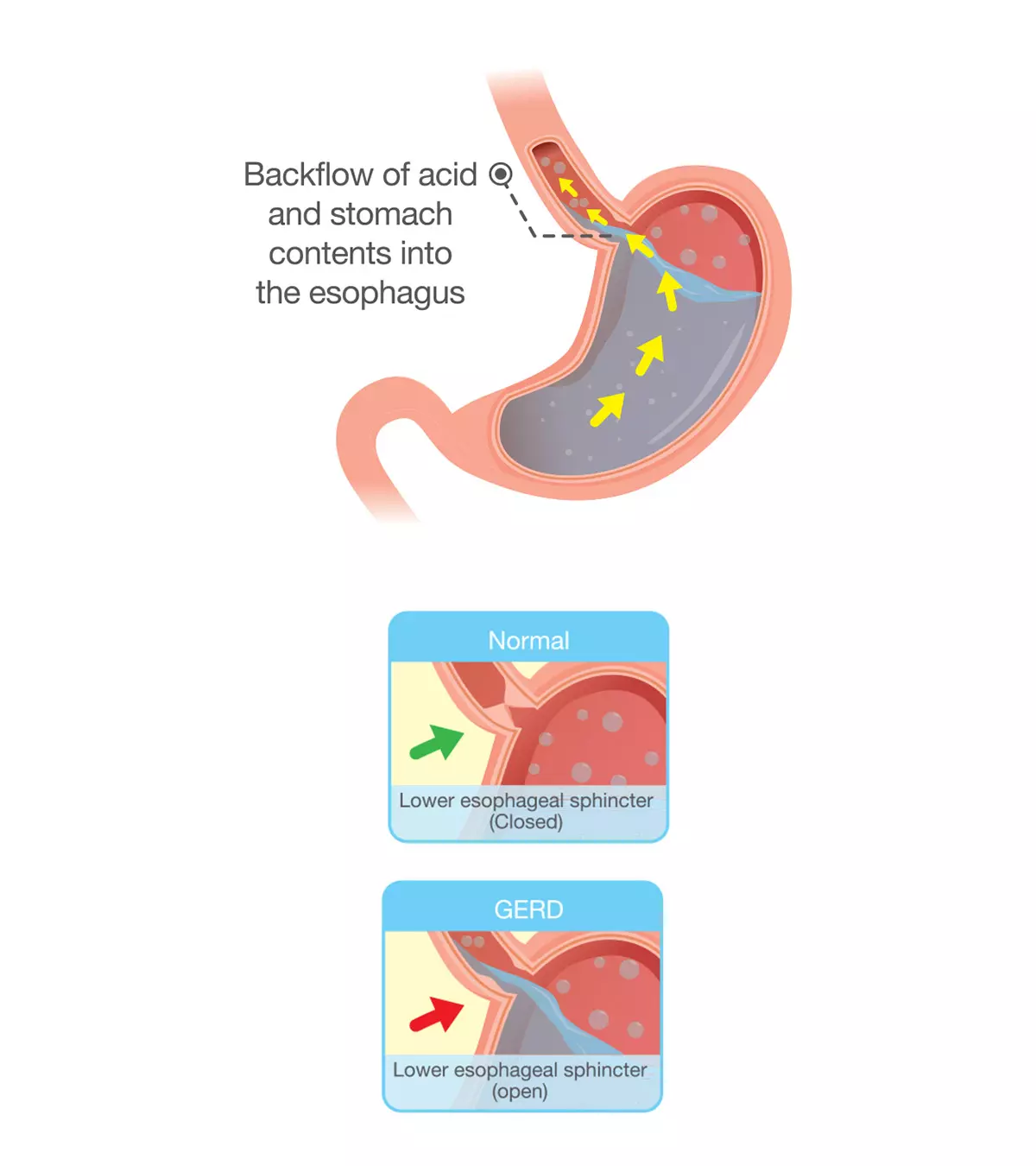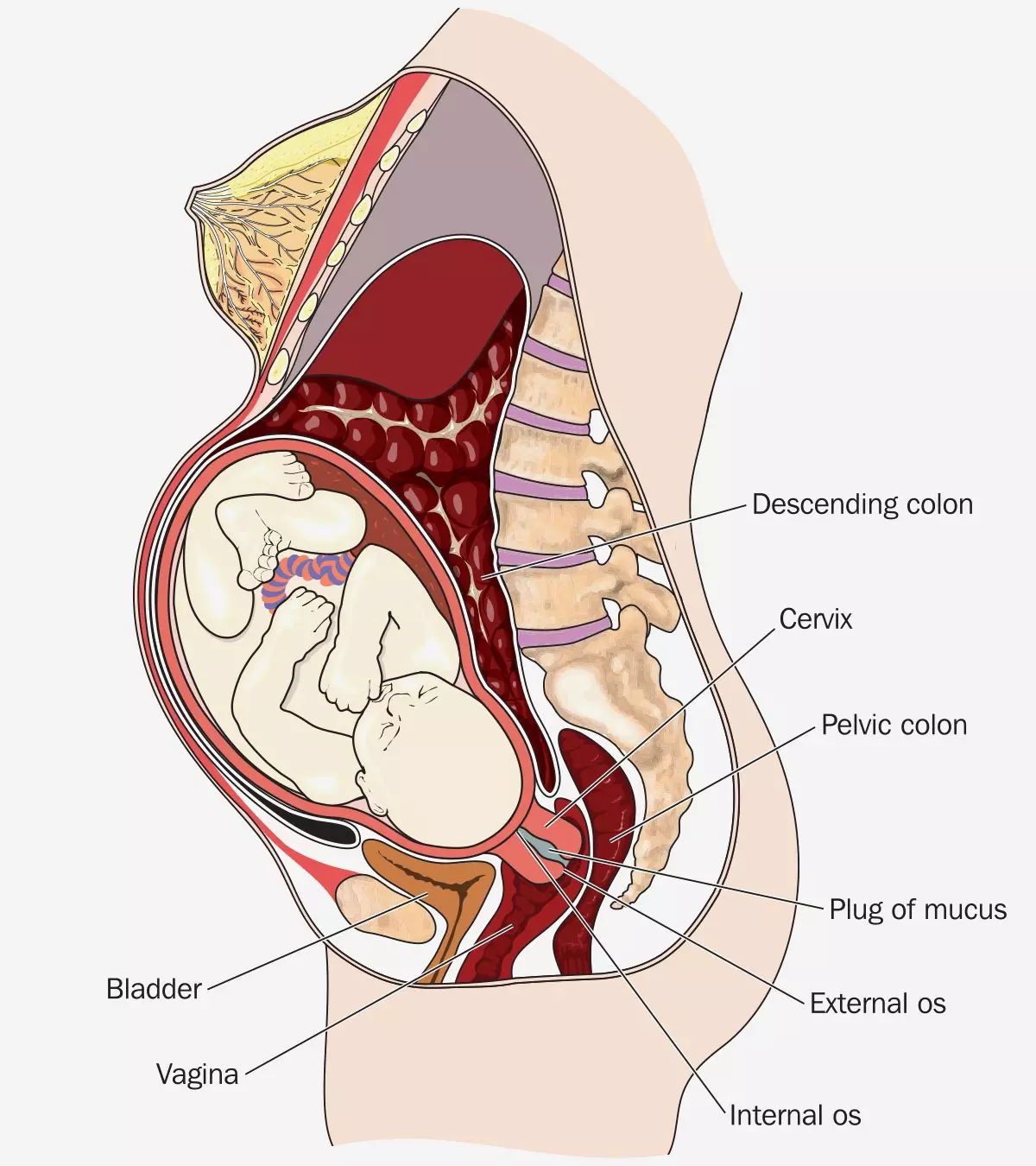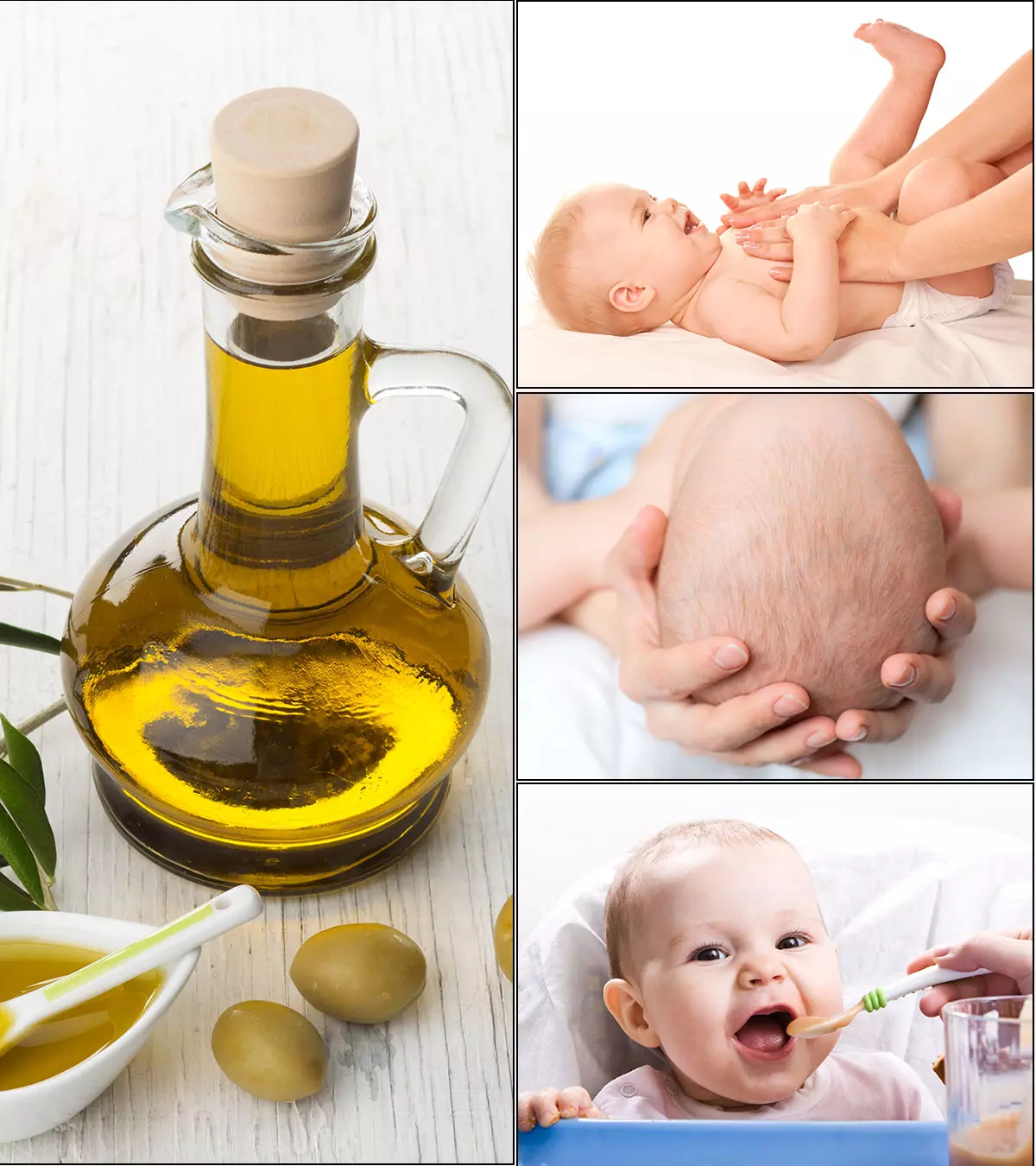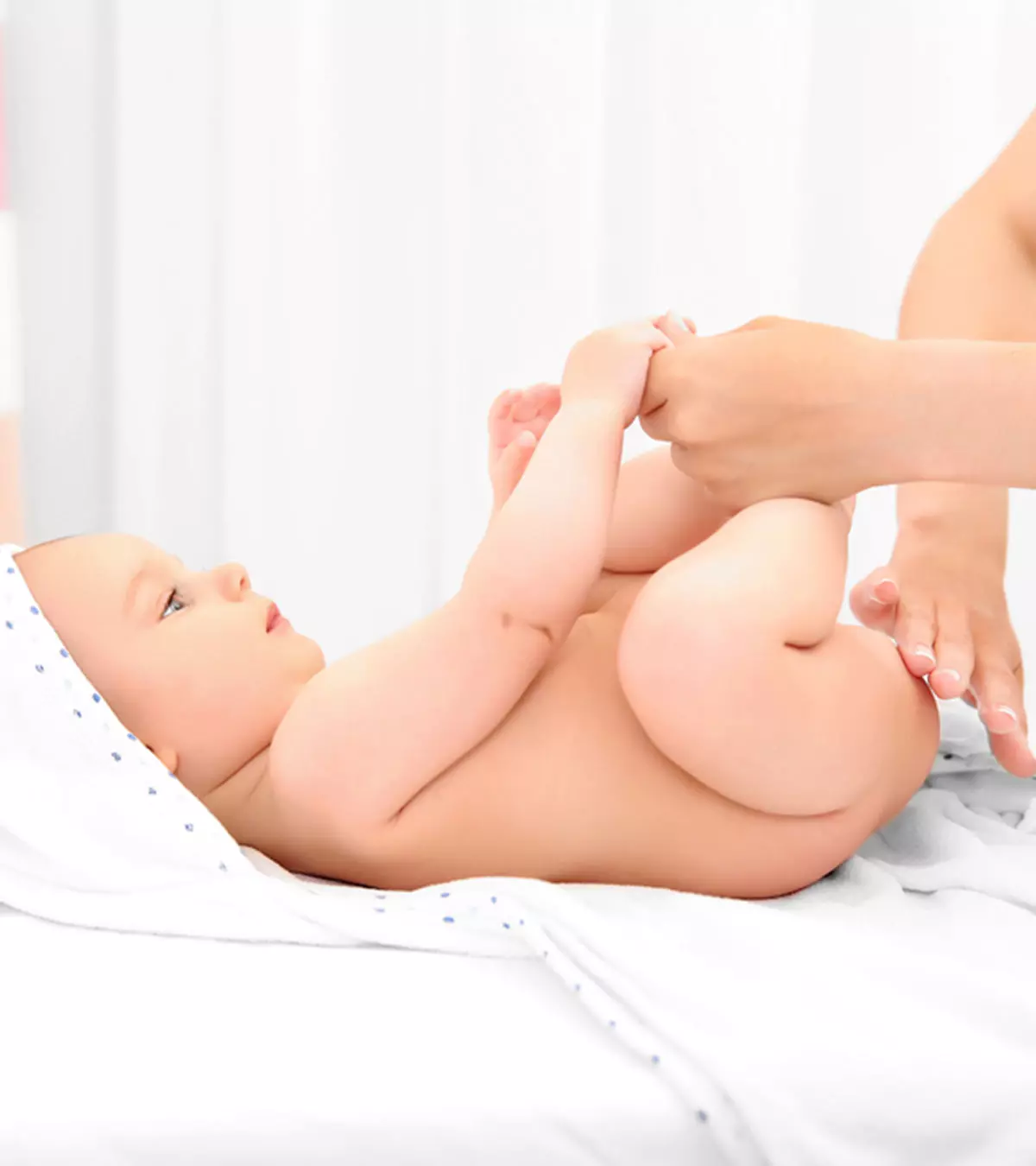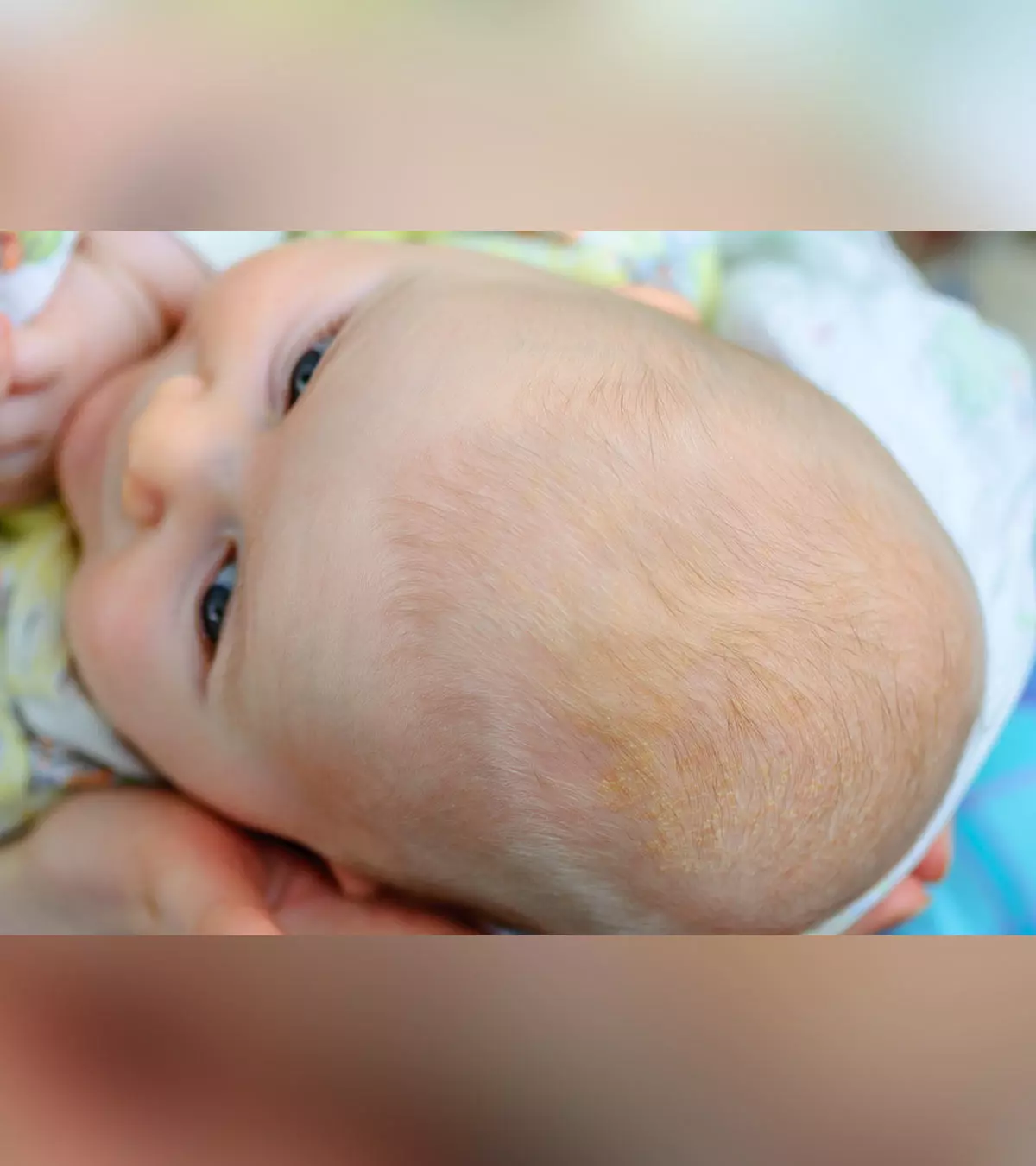
Image: ShutterStock
A baby’s scalp is soft and delicate, making it more susceptible to irritation and dryness. Thus, dry scalp in babies is pretty common. A dry scalp may look similar to a cradle cap in babies, but it is slightly different. However, the cradle cap is often the underlying cause for a dry scalp with white flakes.

Dry scalp in babies may be treated with some home care and can be managed with ease, whereas severe cradle cap may require medical attention. So, how do you distinguish a dry scalp from a cradle cap? And how do you manage it in babies? Keep reading this post to answer these questions and for some effective home remedies to prevent dry scalp in babies.
Key Pointers
- A baby’s dry scalp should not be confused with a cradle cap.
- Scaly skin or reddish yellow discoloration may occur on your baby’s scalp due to harsh weather conditions or shampoos with chemicals.
- You may try using natural oils to soothe the skin, but it is advisable to see a doctor to rule out any skin problems.
Difference Between Dry Scalp And Cradle Cap
Dry scalp is often confused with cradle cap as both have similar symptoms and a common root cause — dry skin. However, both of these are different conditions and need different treatments. Have a look at the table below to understand the difference between dry scalp and cradle cap.
| Dry Scalp | Cradle Cap (seborrheic dermatitis) |
| Dry, flaky skin on the scalp | Starts with flaky skin and turns into rough, crusty bumps |
| Skin on the scalp appears reddish or yellowish and feels scaly to touch | Skin feels rough and crusty and small bumps protrude from the skin |
| Skin feels dry to touch | Skin feels oily to touch |
| May cause itching | Usually not painful or itchy |
| Not hereditaryiA condition or trait that originates from the transfer of genetic information from parents to their offspring | Could be hereditary (1) |
Symptoms Of Dry Scalp In Babies
One of the most prominent signs of dry scalp is white flakes on the head. Other signs include
- Scaly skin that may peel off
- Reddish or yellowish coloration on the skin
- Itching
- Flaky skin that appears as patches in some places on the head
What Causes Dry Scalp In Babies?
Various conditions can cause dry scalp in babies. The following are some of the common causes of dry scalp in babies.
- Harsh weather conditions

Exposure to extreme hot/ cold temperatures or harsh winds can cause the natural oils on your baby’s head to dry up and lead to a dry scalp.
- Extreme exposure to sun
Extreme exposure to sun on the head can also cause scaling and peeling of the skin, which are common signs of dry scalp.
- Long hot-water baths
Giving your child long baths with hot water can strip away the essential oils from the scalp, making it dry and scaly.
- Shampoos with harsh chemicals

This is one of the most common causes of dry scalp. Using shampoos with chemicals that are too strong for your baby’s skin or failing to rinse your baby’s head thoroughly after shampooing may also cause dry scalp.
- Presence of maternal hormones
The presence of maternal hormonesiHormones that may transfer from the mother to the fetus during pregnancy in the child’s body after birth can cause excess oil production in the glands and lead to a dry scalp.
- Other common causes include yeast infections, dandruff, and scalp eczemaiA skin condition causing itchy and dry patches on the scalp (2) (3).
Treatment For Dry Scalp In Babies
Dry scalp is a common condition in babies. If your doctor has ruled out skin conditions, such as eczema, dry scalp can be treated with a few home remedies. If the condition doesn’t subside, your child’s doctor may prescribe an antifungal medication, anti-dandruff shampoo, or mild corticosteroid cream.
Ways To Take Care of Your Baby’s Dry Scalp
- If your infant has a dry, flaky scalp, it is best to avoid washing their hair too often. Shampooing helps remove dirt from the hair, but it also strips away the essential oils from the scalp, making it dry and flaky. So, it is best to wash your baby’s head less frequently.
- Always use mild baby shampoos that do not contain harsh chemicals. Read the labels carefully and avoid products containing sulfates and parabens, as these are known to strip the hair of moisture, making it dry and frizzy. It is important to consult a pediatrician before selecting a conditioner to use for washing your baby’s hair.
- If your baby’s dry scalp is due to dandruff or if they have a cradle cap, consult your pediatrician and use an anti-dandruff shampoo that might help fight dandruff or any scalp infection.
- The key to treating dry scalp is to keep it moisturized. Mineral oils might help provide the needed moisture to the scalp. Olive oil is well-suited for hydrating a dry scalp. As well as olive oil based shampoos. Apply olive oil to your child’s scalp and massage it gently. Next, take a soft hairbrush and brush off the flakes. Leave the oil on the scalp for ten minutes, and then rinse it with a mild shampoo. Repeat this once or twice a week based on the intensity of the condition.
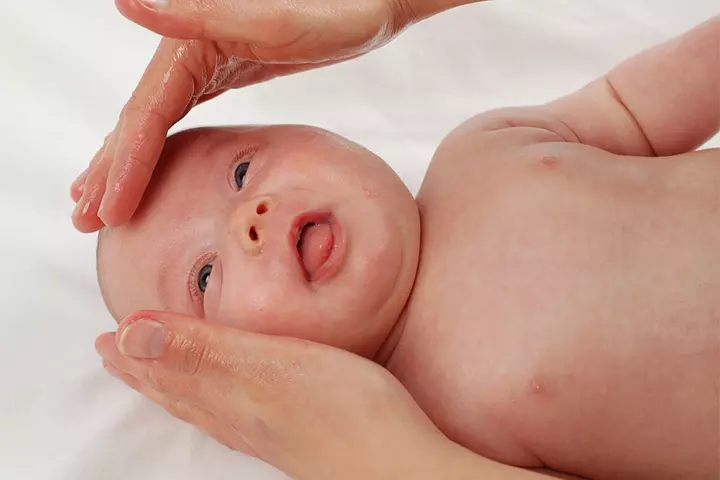
- Always cover your baby’s head with a cap or a scarf when outdoors.
- Make sure you bathe your baby at the optimal temperature (neither too hot nor too cold). Also, avoid giving them long showers.
 Caution
CautionHome Remedies For Dry Scalp In Babies
You can also try some home remedies to reduce dry scalp in babies. As some of these home remedies lack scientific backing, it is best to consult your pediatrician before trying them out.
1. Coconut oil
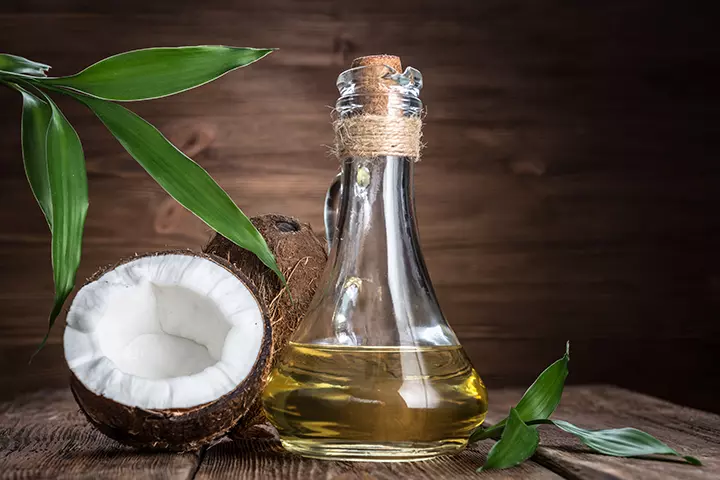
Studies have found that coconut oil is safe and effective in treating a baby’s dry skin. So, you may use it to reduce the dryness of the scalp (4). Apply coconut oil on your baby’s scalp and brush off the flakes and dead skin. Next, rinse your baby’s scalp with a mild shampoo.
2. Tea tree oil
A study published in Clinical Microbiology Reviews states that tea tree oil has antimicrobialiA substance or property that prevents or hinders the growth of microorganisms properties that may help treat baby’s dandruff and yeast infections, which cause dryness of the scalp (5). However, tea tree oil is one of the stronger oils, so it is advised to avoid using it for babies below six months.
 Quick Tip
Quick Tip3. Aloe vera gel

If the dry scalp has led to itching and inflammation, you can use aloe vera gel. Research states that aloe vera gel has anti-inflammatory properties and might help in reducing itching.
Apply aloe vera gel on your baby’s scalp, let it sit for five minutes, and rinse it off with a mild shampoo. Continue this until you see any improvement (6).
4. Banana
Studies suggest that banana helps moisturize the scalp and prevents dryness. It also improves manageability and shine and controls dandruff.
Mash some banana and apply the mixture on your baby’s head, let it sit for five minutes, and rinse it off with a mild shampoo (7).
Remember to rinse off the products from the scalp thoroughly, as residues and oils from these products can increase the scalp’s dryness.
When To See A Doctor?
Depending on the condition, dryness of the scalp can last for several weeks. If you do not see any improvement even after trying the home remedies, or if you find inflammation or redness on your baby’s scalp, seek your doctor’s advice. They may prescribe prescription-strength shampoos and steroid creams. Do not use steroids on your own without consulting a doctor.
Frequently Asked Questions
1. Is baby oil good for a baby’s dry scalp?
Baby oils that contain moisturizers are usually okay to use for a baby’s scalp. If your baby is allergic to nuts, ensure not to use any oils that contain nuts (8).
2. What shampoo is good for a baby’s dry scalp?
As mentioned earlier, a toxin-free shampoo is ideal for the baby’s scalp. However, any shampoo that contains peanut oil is best avoided in children younger than five years (9).
3. Does the baby’s dry scalp go away on its own?
In most cases, a dry scalp goes away without treatment. However, contact a doctor if you see no improvement in your baby’s scalp dryness even after two weeks (10).
4. Does breast milk help with dry scalp?
A Michigan-based pediatric specialist, Dr. Emily Smith, says, “Breast milk has natural moisturizing properties and can be gently applied to the baby’s dry scalp. While some parents find it helpful, it’s important to note that individual responses may vary. If dryness persists or worsens, consulting with a pediatrician is recommended.”
A dry scalp in babies is a common condition where the scalp appears flaky or scaly and causes itching. Sun exposure, dry weather conditions, and shampoos with harsh chemicals may cause the baby’s scalp to lose oil and moisture. Use chemical-free baby products and protect the scalp from drying. You may try home remedies with coconut oil, olive oil, tea tree oil, or aloe vera gel to moisturize the scalp and keep it pathogen-free. Consult a doctor if you feel the need for an anti-dandruff shampoo or other medications.
Infographic: More Home Remedies For Dry Scalp In Babies
A baby’s skin is sensitive, so they may often experience a dry scalp. These remedies might be handy if you want to avoid commercial products to treat your baby’s scalp dryness. However, remember to consult a pediatrician before trying these home remedies. Read the infographic ahead to learn about them.
Some thing wrong with infographic shortcode. please verify shortcode syntax
Illustration: Baby Dry Scalp: Causes Home Remedies And Treatment

Image: Stable Diffusion/MomJunction Design Team
Learn informative tips from dermatologists on how to treat your baby’s cradle cap! Get the best advice on how to keep your baby’s scalp healthy and free of flakes.
References
1. Timothy Nobles; Seneca Harberger; Karthik Krishnamurthy; Cradle Cap; StatPearls (2025).
2. Cradle cap; Mayo Clinic
3. Michelle Foisy, et al.; Overview of Reviews The prevention of eczema in infants and children: an overview of Cochrane and non-Cochrane reviews; HHS Author Manuscripts (2011).
4. Tzu-Kai Lin, et al.; Anti-Inflammatory and Skin Barrier Repair Effects of Topical Application of Some Plant Oils; International Journal of Molecular Sciences (2018).
5. C. F. Carson, K. A. Hammer, and T. V. Riley; Melaleuca alternifolia (Tea Tree) Oil: a Review of Antimicrobial and Other Medicinal Properties; Clinical Microbiology Reviews (2006).
6. Renata Dawid-Pać; Medicinal plants used in the treatment of inflammatory skin diseases;; Advances In Dermatology and Allergology (2013).
7. K. P. Sampath Kumar, et al.; Traditional and Medicinal Uses of Banana; Journal of Pharmacognosy and Phytochemistry (2012).
8. Baby massage; Pregnancy, Birth and Baby
9. Cradle cap; Pregnancy, Birth and Baby
10. Cradle Cap: What You Should Know; St. Louis Children’s Hospital
Community Experiences
Join the conversation and become a part of our nurturing community! Share your stories, experiences, and insights to connect with fellow parents.
Read full bio of Dr. Mubina Agboatwalla
- Dr. Emily Smith is a certified pediatric specialist with over five years of experience. She is an associate professor of Dermatology and Pathology at Michigan Medicine. Dr. Smith attended Northwestern University for undergraduate education and Medical College of Georgia for medical school.
 Dr. Emily Smith is a certified pediatric specialist with over five years of experience. She is an associate professor of Dermatology and Pathology at Michigan Medicine. Dr. Smith attended Northwestern University for undergraduate education and Medical College of Georgia for medical school.
Dr. Emily Smith is a certified pediatric specialist with over five years of experience. She is an associate professor of Dermatology and Pathology at Michigan Medicine. Dr. Smith attended Northwestern University for undergraduate education and Medical College of Georgia for medical school.
Read full bio of Rohit Garoo
Read full bio of Dr. Ritika Shah
Read full bio of Anindita Ghatak





